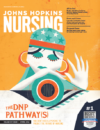Midwives key to thwarting or at least undermining abuse
Women experiencing pressure about reproductive health decisions may not always recognize the patterns of an intimate partner’s behavior as reproductive coercion. Factors like age differences, previous violence, or romantic feelings may prevent a woman from seeking help.
In “Caring for Women Experiencing Reproductive Coercion,” PhD student Karen Trister Grace, MSN, stresses the role of midwives in screening for and thwarting such abuse, which can
include withholding contraceptive pills, tampering with condoms, or using threats.
Cultural norms, gender roles and expectations, and interpretations of masculinity impact how men and women experience and understand decisions and pressure regarding reproductive health.
For women who screen for or report reproductive coercion, midwives and other providers may consider undetectable contraception such as IUDs, implants, or injectables, the article suggests.
“The dissemination of a wallet-sized information card on healthy relationships and coercive tactics in relationships has been shown to have a significant impact on reproductive coercion, as well as the ability of women receiving the intervention to end unhealthy relationships. The intervention was found to reduce the odds of pregnancy coercion by 71% and to significantly increase the odds of ending a relationship due to perceptions that it was unhealthy,” writes Grace, a certified nurse midwife.
The article also offers advice for providing a safe space away from abusers who insist on attending health care sessions and children older than 3 who might be prompted to repeat what they have heard.
Publication: Journal of Midwifery & Women’s Health, January 2016
